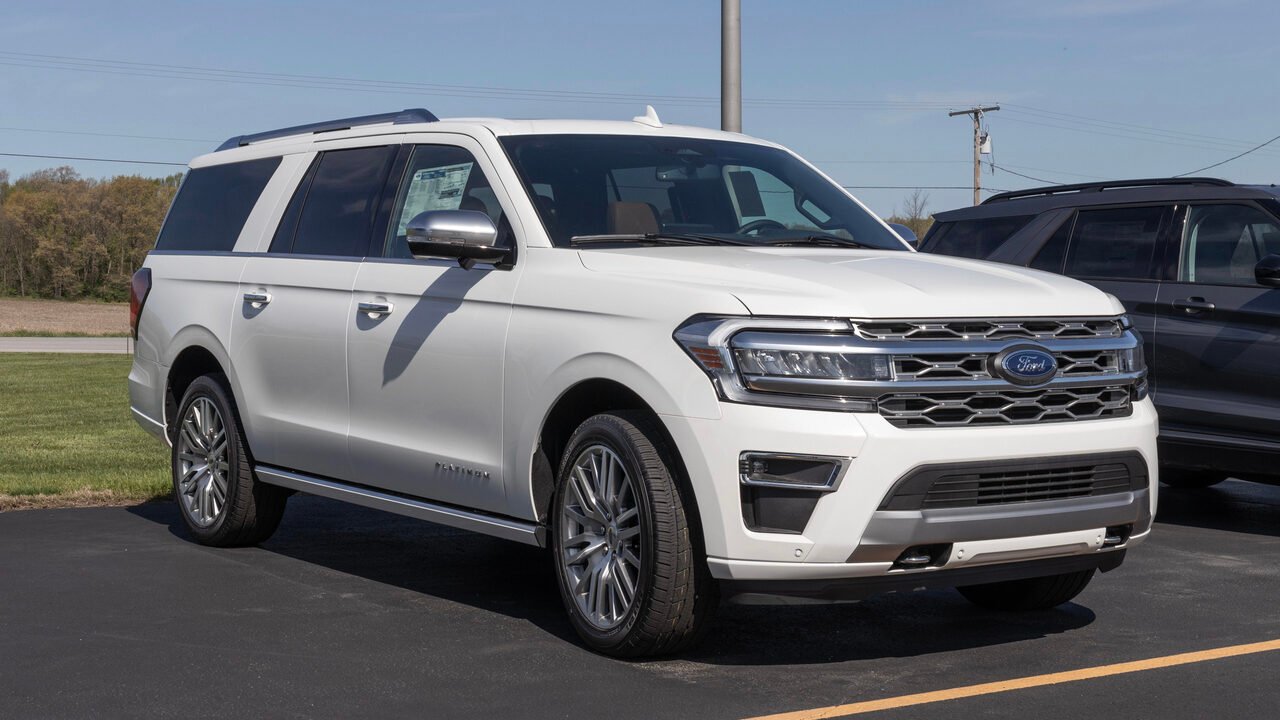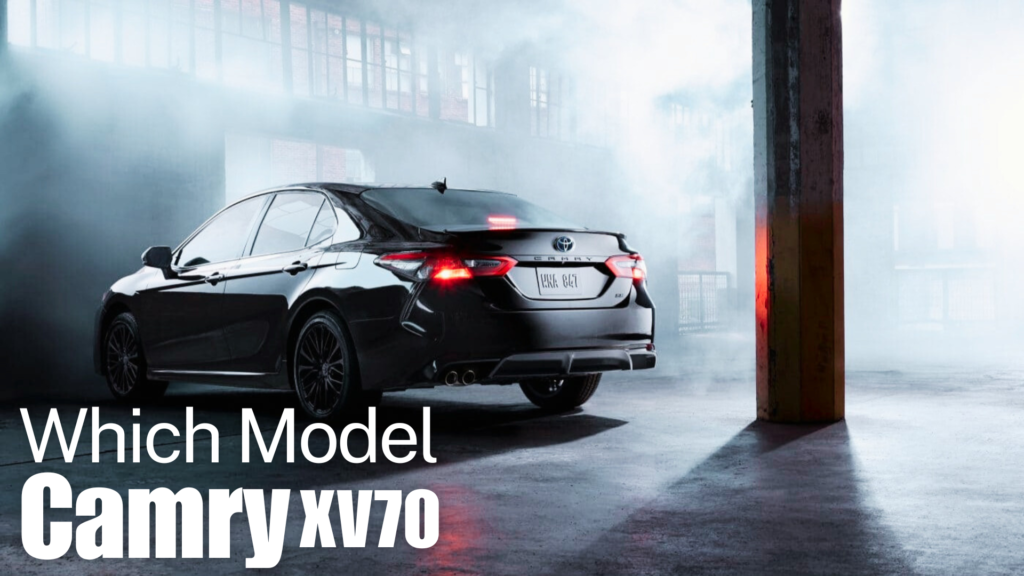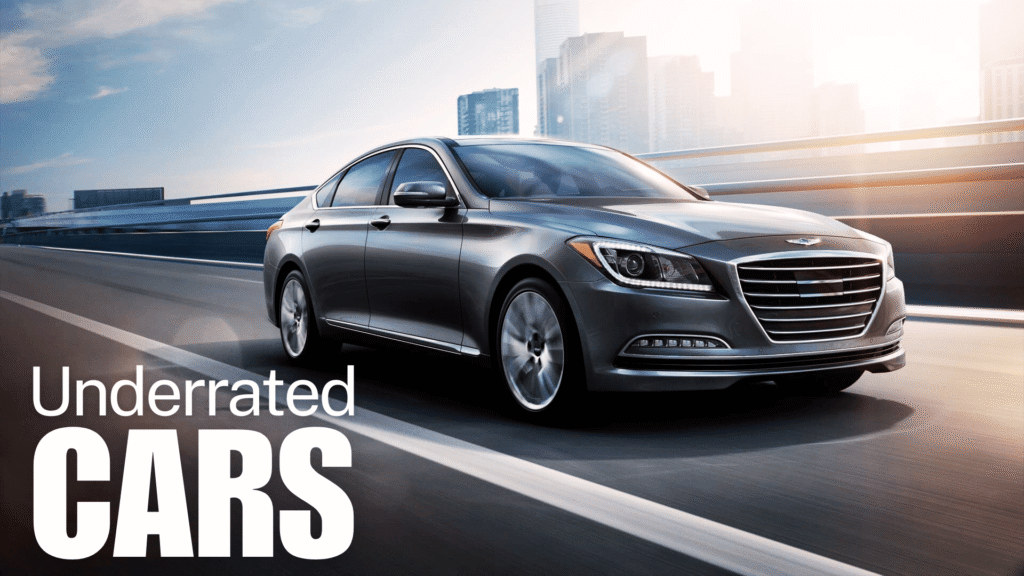Large SUVs usually bring to mind strength, plenty of space, and useful features. But they can also guzzle gas, which might turn some buyers away even if they genuinely need the extra room. The good news is that thanks to recent improvements, many of them now offer way better fuel efficiency, so you can save on gas and help the environment at the same time. If you’re on the hunt for a large SUV that’s easier on your wallet at the gas station, there are a ton of awesome choices for 2024. Stick with us in this guide as we explore the top fuel-efficient large SUVs, using info from Consumer Reports and EPA data.
Top 5 Fuel-Efficient Large SUVs in 2024
These SUVs give you great gas mileage while still packing a punch with power and utility so you really get the best of both worlds:
1. 2024 Toyota Sequoia Hybrid

MPG: 21 City / 24 Highway / 22 Combined
The 2024 Toyota Sequoia Hybrid brings together Toyota’s i-FORCE MAX twin-turbo V6 hybrid system and a ten-speed automatic for some serious everyday power while cutting back on gas compared to older V-8 engines. It’s got around 437 hp and 583 lb-ft of torque in factory setup. With this hybrid setup, you can expect about 22 mpg combined for rear-wheel drive models, which breaks down to around 21 in the city and 24 on the highway. The all-wheel drive versions are just a bit lower, but still pretty good numbers for a big three-row SUV that can tow over 9,000 lbs if it’s set up right. The way this system is designed focuses more on low-end torque and smoothing out the turbo response, so you get instant power without having to rev the engine a lot. This helps with fuel efficiency in normal driving, but keep in mind that highway MPG might drop if you go fast or have a heavy load. To sum it up, the Sequoia Hybrid gives you the capability of a large SUV with better fuel efficiency compared to traditional gasoline V-8s, which is a nice tradeoff for families who tow stuff but don’t want to stop for gas all the time.
2. 2024 Ford Expedition Hybrid

MPG: 19 City / 23 Highway / 21 Combined
The 2024 Expedition comes with a solid 3.5-L twin-turbo V6 that delivers around 380 to 400 hp and about 470 to 480 lb-ft of torque, which is even higher on some trims. It’s paired with a 10-speed automatic and gets roughly 19 mpg combined in a lot of setups. This is all about towing and being comfortable on the highway rather than getting the best fuel economy. If you opt for the Heavy-Duty Trailer Tow package, the Expedition’s towing capacity can reach over 9,000 lbs, which is why Ford has gone with a strong turbo V-6 for this vehicle.
Now if Ford decided to put the F-150’s PowerBoost hybrid system into the Expedition, you’d probably see much better gas mileage in the city and highway plus more low-end electric power. You’d be looking at mid-20s mpg instead of the high teens now, but this would also add some weight and cost, plus it could slightly change the max tow capacity based on how everything is set up. For now, just stick with the 2024 Expedition’s EcoBoost numbers and keep an eye on Ford’s plans for a hybrid full-size SUV down the line.
3. 2024 Chevrolet Tahoe Diesel

MPG: 21 City / 28 Highway / 24 Combined
The 2024 Chevrolet Tahoe has an optional 3.0-liter Duramax turbo-diesel V6, which is great if you want something efficient in the full-size SUV category. It gives you strong low-end torque while also allowing for long trips, making it perfect for highway driving or hauling heavy stuff. You’ll get about 277 hp and around 460 lb-ft of torque, which means you can pass and tow confidently without having to push the engine hard.
When it comes to fuel economy, the EPA says the diesel Tahoe delivers about 21 mpg in the city and 28 mpg on the highway for the two-wheel drive version. If you go for the four-wheel drive model, it’s a bit lower at around 20 city and 26 highway. This makes it the most fuel-efficient option in the Tahoe lineup for long highway stretches. Plus, it can tow up to 8,200 pounds when equipped properly, so you won’t lose out on utility just for better mileage.
The Duramax engine is designed to give you good torque at lower speeds and smooth cruising on the highway. So while you can expect great fuel numbers for long trips, keep in mind that if you’re doing a lot of short trips or driving aggressively, that efficiency may dip. That’s why even though the fuel economy is impressive, it might not be our top pick overall.
4. 2024 Jeep Grand Cherokee L 4xe (Plug-in Hybrid)

MPGe: 56 Combined (Electric + Gas)
The 2024 Jeep Grand Cherokee L 4xe is a cool plug-in hybrid that gives you a nice mix of power and electric vehicle perks. With its 2.0-liter turbo engine and electric motors, it cranks out around 375 hp and 470 lb-ft of torque. This means this big three-row SUV can tow and speed up in surprising ways. You can expect it to have a decent all-electric range of about 25 to 26 miles and it’s said to get around 56 MPGe for mixed driving. So for your day-to-day trips, you might barely need to fill up on gas.
Even with this electric setup, Jeep made sure the 4xe can still work hard. It can tow up to 6,000 pounds when it’s properly set up, which is pretty close to what the gas models can handle. The system is smart too, focusing on electric power right off the line to reduce turbo lag and help save fuel in the city. Plus the hybrid setup lets you enjoy a smooth drive and gives you a combined driving range close to 470 miles with a full tank and battery.
5. 2024 BMW X7 xDrive40i

MPG: 21 City / 25 Highway / 23 Combined
The 2024 BMW X7 xDrive40i is powered by a 3.0-liter turbocharged inline-six engine along with a 48-volt mild-hybrid system. This combo pumps out around 375 hp and about 398 lb-ft of torque so you get a nice boost to keep this big luxury SUV feeling lively without having to push it too hard. Power goes through an eight-speed automatic transmission and BMW’s xDrive all-wheel-drive system which gives you dependable grip and smooth handling.
When it comes to fuel efficiency, the EPA gives the xDrive40i a rating of about 21 mpg in the city, 25 mpg on the highway, and 22 mpg combined. That’s pretty good considering its size and weight. The mild-hybrid setup really helps with low-end torque, smooth starts and stops, and quick response but it doesn’t really focus on saving fuel like a full hybrid would.
In a nutshell, the X7 xDrive40i is all about refinement and punchy performance. It offers three-row comfort and decent speed while keeping fuel economy competitive for its class. But if you’re after the best MPG, you might want to check out hybrid or diesel options instead.
What Affects Fuel Economy in SUVs?
Fuel economy in SUVs can be influenced by a bunch of things, here are they:
- Vehicle mass / payload: heavier cars and extra cargo require more energy to accelerate; lighten the load when you can.
- Aerodynamics (CdA): drag rises with speed; roof racks, open windows, and boxy shapes cost mpg at highway speeds.
- Powertrain efficiency: engine design, turbo vs NA, CVT/automatic gearing, and hybrid systems determine how much fuel becomes forward motion.
- Tire rolling resistance & pressure: low-rolling-resistance tires and correct pressure cut consumption; underinflation hurts mileage.
- Driving style & speed: rapid accelerations, hard braking, and high cruising speeds dramatically worsen fuel use.
- Accessory loads: A/C, heated seats, and electrical accessories put extra load on the engine or alternator.
- Terrain & route: hilly, stop-start, or congested routes reduce average mpg compared with steady highway cruising.
- Towing / aeroload: trailers and payload increase fuel burn disproportionately.
- Mechanical condition & maintenance: clogged filters, old spark plugs, worn fluids, and misalignment reduce efficiency.
- Fuel quality & octane: wrong fuel or contaminated fuel can affect combustion efficiency and power.
- Temperature & climate: cold weather thickens fluids, reduces battery/hybrid efficiency, and increases warm-up losses.
- Regenerative systems & tech: hybrids/PHEVs recover energy and can dramatically improve real-world economy in city driving.
Any of those factors or even a mix of a few can really impact how fuel-efficient a vehicle is. That’s why the numbers you see on paper might not match what you actually get in real life.
Hybrid vs. Diesel: Which Offers Better Fuel Economy?
Short answer: it depends on how you drive. Hybrids (and PHEVs) shine in stop-start, urban driving — regenerative braking and electric assist recover energy that pure-combustion engines waste, so in city cycles hybrids can beat diesels by a wide margin. Diesels, by contrast, excel on sustained highway runs: diesel fuel’s higher energy density and lean-burn efficiency give diesels an edge for long-distance cruising and heavy loads, often yielding noticeably better mpg at steady speeds.
So which to pick? If your day is mostly commutes, errands, and short trips, a hybrid or PHEV will usually deliver the best real-world fuel economy and lower operating cost. If you regularly rack up highway miles, tow, or carry heavy loads, a modern diesel will typically return superior long-haul mpg. Don’t forget total cost of ownership: fuel price, servicing (DPF/DEF on diesels), battery degradation or replacement risk for hybrids, and local emissions rules can swing the math — factor those into your decision, not just the headline mpg.
| Factor | Hybrid SUVs | Diesel SUVs |
|---|---|---|
| Best For | City driving & short trips | Long highway trips |
| Fuel Efficiency | Higher in stop-and-go traffic | Higher on highways |
| Towing Capability | Slightly lower | Superior torque for towing |
| Maintenance Costs | Lower | Higher (due to emissions systems) |
Tips to Maximize Your SUV’s Fuel Efficiency
Regardless of the model you choose, here’s how to improve fuel economy:
- Keep Your Tires Inflated – Proper tire pressure reduces rolling resistance.
- Drive Smoothly – Avoid rapid acceleration and hard braking.
- Use Cruise Control – Maintains optimal fuel efficiency on highways.
- Lighten Your Load – Excess weight decreases MPG.
- Regular Maintenance – Keep your engine and transmission in top shape.
Final Thoughts: Choosing the Right SUV for You
For the best fuel efficiency, the 2024 Toyota Sequoia Hybrid is a smart pick if you’re looking for a big SUV that can handle just about anything without hitting your wallet too hard. If you usually cruise on highways or take long trips, then the 2024 Chevrolet Tahoe Diesel is even better since it can save you a ton on gas. Just don’t get it if you mostly drive short distances for work.
If you liked this post, you might want to check out “Here Are the Top 10 Longest Lasting SUVs You Can Buy Today.” We’ve got loads of other cool stuff on our site too. Whether you’re looking for car reviews, buying tips, or just the latest news in the auto world, we’ve got the info to keep you updated. Take a look around and don’t forget to save our homepage so you won’t miss any new posts!
- Best Car Interior Cleaning Kits: Make Your Cabin Look New
- Which XV70 Camry Year Should You Buy? A Tested Guide
- Magnetic Phone Mounts & Mounts for Thick Cases: That Actually Work!
- Best Wireless CarPlay Adapters for Older Cars
- Best Seat Gap Fillers for Leather Seats
- The Most Underrated Cars — Hidden Gems You Should Actually Consider
*Disclaimer: This website provides automotive content for informational purposes only and should not be considered professional advice. While we strive for accuracy, we do not guarantee the reliability or suitability of any vehicle or product mentioned—always conduct your own research before making purchasing decisions. Additionally, some links on this site are affiliate links, meaning we may earn a commission if you make a purchase, at no extra cost to you.







